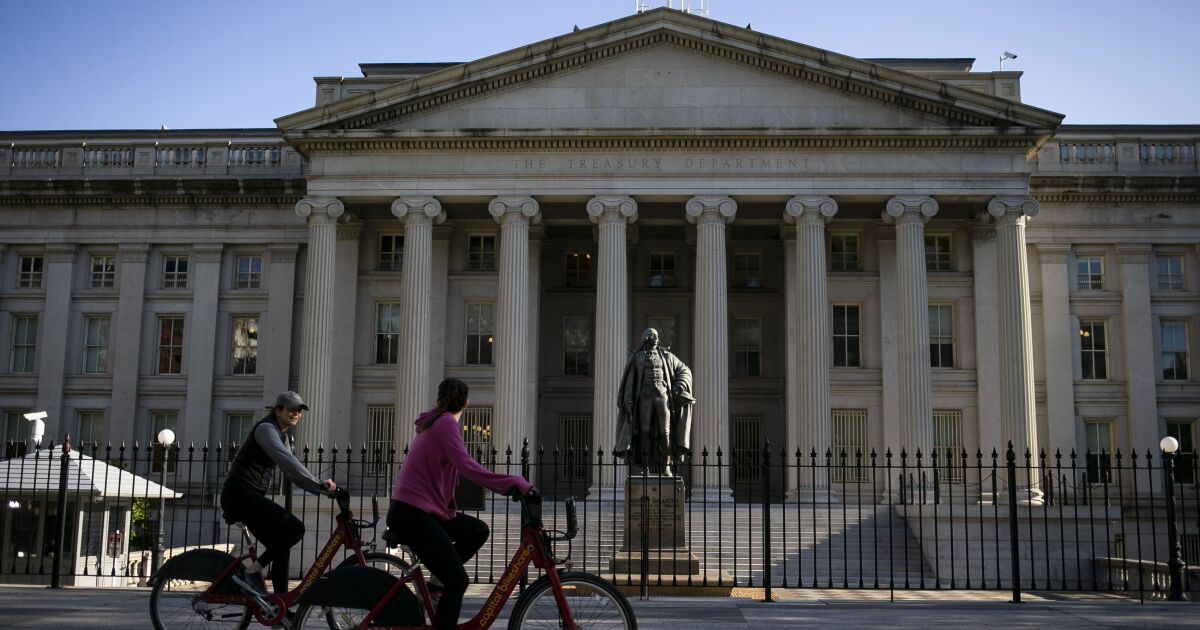
Treasury yields plunged Tuesday as a slower-than-anticipated pace of consumer price growth last month bolstered the view that the Federal Reserve's most aggressive interest-rate hiking cycle in decades is over.
The 10-year note's yield fell as much as 21 basis points to 4.43, the lowest level since Sept 22. Meanwhile, the 30-year bond's yield fell about 15 basis points to 4.61%. Swap contracts used to hedge future Fed actions marked down the odds of another rate increase to almost nil and shifted the timing of an anticipated cut to June, and priced in an additional quarter-point cut in July. By the end of 2024 traders now see the U.S. central bank slashing rates by a full percentage point.
Ten-year yields, a benchmark for global borrowing, have plunged now by over half a percentage point since reaching a 16-year high of 5.02% on Oct. 23. The bond market recovery has come amid some bouts of wild back-and-forth swings, yet is gaining ground since the Fed left its benchmark policy rate unchanged earlier this month.
"I do think the Fed is done," said Tony Farren, managing director in rates sales and trading at Mischler Financial Group. "The peak in inflation is over, that's obvious. We've also seen the high in yields unless oil goes over $100 a barrel and stays there for some time, then all bets are off."
The U.S. consumer price index was unchanged in October versus a median estimate of a 0.1% increase in Bloomberg's survey of economists. Core CPI, which excludes food and energy, increased 0.2% compared with the 0.3% median estimate. The year-on-year rate slowed to 4% against an estimate of 4.1%.
Despite the market pricing for a quick Fed policy shift next year, some suspect it won't happen so fast given inflation is still above the Fed's target. In addition, U.S. central bank officials have repeatedly warned markets that they're in no rush to cut rates.
"I still think that inflation will take time to come down and that will leave the Fed on hold longer than you typically see during a cycle," Erin Browne, the portfolio manager for multi-asset strategies at Pacific Investment Management Co., said on Bloomberg television. "The Fed is not going to take its applause and take a bow with just one data print," and will wait "to make sure that the data continues to confirm that inflation will fall."
Overall Pimco is bullish on bonds, sticking with a 2024 forecast they and others had for this year that didn't pan out.
Hope is building now that with the fall in yields in recent weeks, bond investors could avoid what looked like a sure thing just a few months ago — a third straight year of losses in Treasuries. A broad index of Treasuries was down 1.2% this year through Monday, after losing an unprecedented 12.5% last year and 2.3% in 2021.
Short-term yields also plunged Tuesday as traders anticipated a quicker Fed pivot to cutting rates.
Swaps contracts indicate the effective funds rate will fall to nearly 4.33% by December 2024 from 5.33% currently.
"The bar for further rate hikes is getting higher and higher at this point," Jay Bryson, Wells Fargo & Co. chief economist, said on Bloomberg Television.



